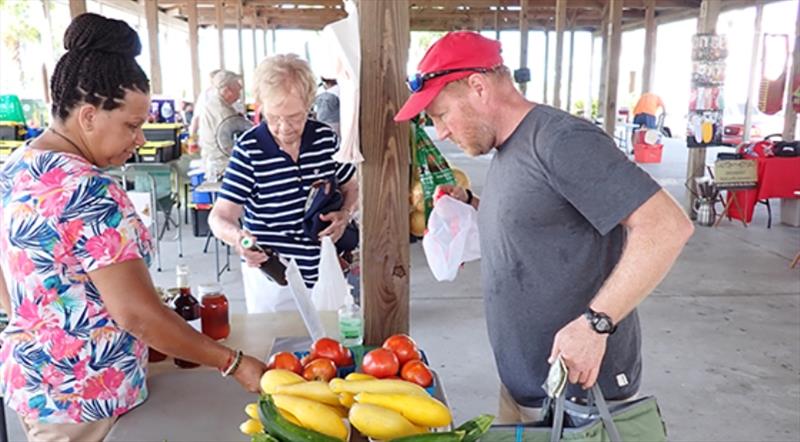
Green provisioning for cruising
by Janet Gannon, Sailors for the Sea 18 Sep 2022 15:41 UTC

We find locally-sourced foods, often in minimal plastic packaging, at farmer's markets © Sailors for the Sea
One of the things my husband, Sailors for the Sea Skipper Damon Gannon, and I love about living aboard Fulmar, our Pacific Seacraft 37, is how conscious we are about the resources we use.
Whatever we need, we have to make an effort to get it. Our awareness of waste is greater when we have limited space and resources, so we've been working towards being greener in our provisioning. Here are some things we do to be more earth-friendly when we bring supplies aboard:
Visit our local farmer's market. On a typical trip to our grocery, we find it almost impossible to buy anything that's not wrapped in plastic. Luckily, we can hop on our bikes and visit our farmer's market every Saturday. We come home having used a lot less plastic. Plus we meet our neighbors, support small businesses, and eat more locally-produced food when we shop at the farmer's market. There are downsides to our visits in that there is less variety and less flexibility in terms of when we shop, but we think the upsides are worth it.
Buy in bulk. Although shopping at the local farmer's market is great for produce, we also hit up our warehouse club. Having huge quantities isn't always boat-friendly, but buying in bulk can reduce single-use packaging and trips to the store. This is particularly true for paper products (yes, we can fit 36 rolls of TP in the nooks and crannies of the boat), produce, and anything that comes in aluminum cans (which are highly recyclable).
Reduce food waste. Sometimes, the lofty goals we have while shopping fall by the wayside as the week progresses. We buy asparagus or eggplant or cucumber with the best of intentions but forget about that poor produce, and end up tossing it when we find its wilted carcass at the bottom of our cavernous fridge. To reduce waste, we keep a small white board in the galley with a list of perishables that need to be used. This helps us cook healthier meals that use what we have on-hand.
Package food with forethought. In addition to our reusable grocery bags, we have mesh produce bags to reduce plastic use when we buy tomatoes, onions, or lettuce. We have only one type of food storage container so all the tops fit all the bottoms. And we use silicone bowl covers and bees-wax sheets to preserve food without using plastic or foil. These steps help us cut waste and make our food last longer.
Eat more plants. There are lots of reasons to reduce meat consumption, including the negative effects of raising animals on the environment. We try to enjoy plant-based meals several times a week. These can be simple, such as swapping veggie burgers for meat, enjoying bean-sweet potato burritos (add in some pickled red onions for a kick), or making "tu-no" salad out of mashed chickpeas. Even having a "meatless Monday" can make a difference. In addition to reducing our environmental impact, using less meat on the boat means fewer perishable items that need to stay refrigerated.
Use intent when buying online. If you had told me 20 years ago that I could press a button and whatever doodad I wanted would magically arrive a couple of days later, I would have been amazed. Online shopping has changed the way we live and as someone provisioning in a small town, it's eased the burden of searching for all the things we need. But buying online has its downside. It can generate a huge amount of single-use packaging and requires more fossil fuel to deliver goods to consumers. So using it to buy everyday items you could get at a local store may not be the greenest choice. And free returns are nice, but ordering something that you then return wastes a lot of resources.
Avoid bottled water and seltzer. We installed an inexpensive water filter on our pressure-water system to make our tank water more palatable. We've also been known to add a drop of bottle lemon juice or artificial water flavors. This helps us resist the urge to bring bottled water aboard. If we had room, we'd bring our SodaStream on the boat too. Another way we avoid bottled water is by having insulated water bottles to fill and refrigerate.
The decisions about what items to include in your provisioning involve tradeoffs and compromises. You may not always be able to go with the "greenest" choices. But be conscious of your consumer decisions and their consequences. Don't let perfect be the enemy of good.